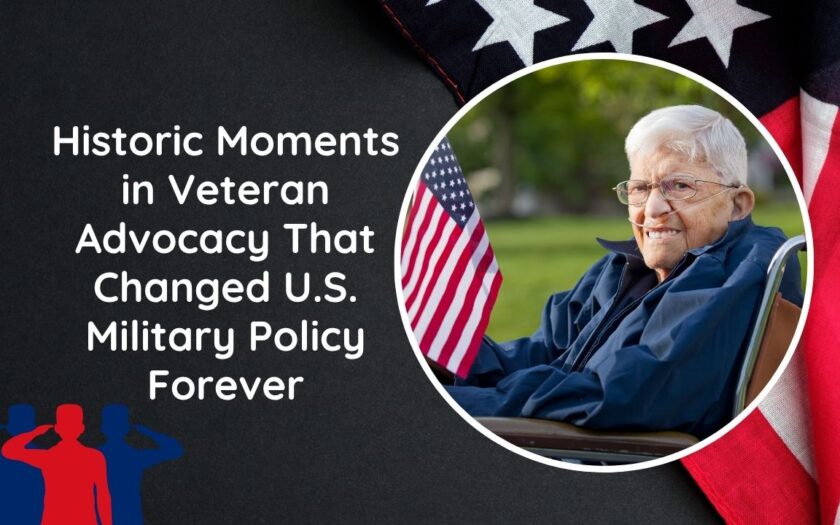Veterans have long been at the forefront of advocating for policies that honor their service and address their unique needs.
Their efforts have led to significant legislative changes, transforming U.S. military policy and ensuring better support for those who have served.
This article delves into key moments in veteran advocacy that have left an indelible mark on military policy.
Veteran advocacy has been instrumental in shaping U.S. military policy. From securing educational benefits to challenging discriminatory practices, veterans have consistently pushed for reforms that reflect their sacrifices and needs.
Their advocacy has not only improved the lives of service members but has also set precedents for future policy changes.
The GI Bill of 1944: A Transformative Leap
The Servicemen’s Readjustment Act of 1944, commonly known as the GI Bill, was a landmark piece of legislation that provided returning World War II veterans with various benefits, including:
- Education: Tuition and living stipends for college or vocational training.
- Home Loans: Low-interest loans for purchasing homes.
- Unemployment Benefits: Temporary financial assistance while seeking employment.
This act significantly contributed to the expansion of the American middle class and is considered one of the most effective pieces of social legislation in U.S. history.
Executive Order 9981: Desegregating the Armed Forces
Issued by President Harry S. Truman on July 26, 1948, Executive Order 9981 mandated the desegregation of the U.S. Armed Forces.
This order was a response to racial discrimination and was influenced by incidents such as the brutal attack on Isaac Woodard, an African American World War II veteran.
The executive order laid the groundwork for the civil rights movement within the military, promoting equality of treatment and opportunity for all service members.
The Winter Soldier Investigation: Exposing War Atrocities
In 1971, the Vietnam Veterans Against the War (VVAW) organized the Winter Soldier Investigation in Detroit, Michigan.
Over three days, veterans testified about war crimes and atrocities they had witnessed or committed during the Vietnam War.
This event brought attention to the moral and ethical implications of the war and spurred public debate, leading to increased scrutiny of military operations and policies.
Post-9/11 GI Bill: Expanding Educational Benefits
Signed into law in 2008, the Post-9/11 Veterans Educational Assistance Act, commonly known as the Post-9/11 GI Bill, expanded educational benefits for veterans who served after September 11, 2001. The new provisions included:
- Full Tuition Coverage: For in-state public colleges and universities.
- Housing Allowance: Monthly stipends based on the cost of living.
- Book Stipends: Financial assistance for textbooks and supplies.
This expansion significantly increased access to higher education for veterans and their families.
The Honoring Our PACT Act: Addressing Toxic Exposure
Signed into law in 2022, the Honoring Our PACT Act is one of the most comprehensive veterans’ health care and benefits expansions in U.S. history.
The act addresses health issues related to toxic exposures during military service, including:
- Expanded Eligibility: For veterans exposed to burn pits, Agent Orange, and other toxins.
- Presumptive Conditions: Added over 20 conditions presumed to be service-connected due to toxic exposure.
- Toxic Exposure Screenings: Mandatory screenings for all veterans enrolling in VA health care.
This legislation was a direct result of persistent advocacy by veterans and their families, highlighting the long-term health consequences of toxic exposures.
LGBTQ+ Veterans and the Fight for Recognition
The “Don’t Ask, Don’t Tell” (DADT) policy, enacted in 1993, prohibited openly LGBTQ+ individuals from serving in the military.
Although repealed in 2011, many veterans discharged under DADT faced challenges accessing benefits due to their discharge status.
In 2021, the VA began providing benefits to veterans who were discharged under DADT, acknowledging the unjust nature of their discharges and the need for recognition and support.
The Feres Doctrine: A Barrier to Justice
The Feres Doctrine, established by a 1950 Supreme Court decision, prevents military service members from suing the government for injuries or deaths that occur during service.
This doctrine has been a significant barrier to justice for military personnel and their families. Advocacy groups continue to challenge the doctrine, seeking accountability and legal recourse for service-related incidents.
Veteran advocacy has been instrumental in shaping policies that honor the service and sacrifices of military personnel.
From securing educational benefits to challenging discriminatory practices, veterans have led efforts that have resulted in significant legislative changes.
Their continued advocacy ensures that the nation remains committed to supporting those who have served.
FAQs
What is the GI Bill, and how did it impact veterans?
The GI Bill, enacted in 1944, provided returning World War II veterans with benefits such as education, home loans, and unemployment assistance. It played a crucial role in helping veterans reintegrate into civilian life and contributed to the post-war economic boom.
How did Executive Order 9981 affect the military?
Executive Order 9981, issued in 1948, mandated the desegregation of the U.S. Armed Forces. It was a significant step toward racial equality within the military and set a precedent for civil rights advancements in the armed forces.
What is the Honoring Our PACT Act, and who does it benefit?
The Honoring Our PACT Act, signed into law in 2022, addresses health issues related to toxic exposures during military service. It expands eligibility for VA health care and adds over 20 presumptive conditions for veterans exposed to burn pits, Agent Orange, and other toxins, benefiting veterans from the Vietnam War, Gulf War, and post-9/11 eras.

